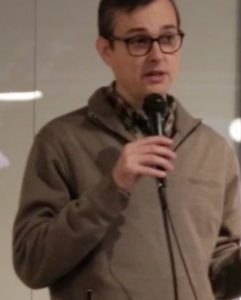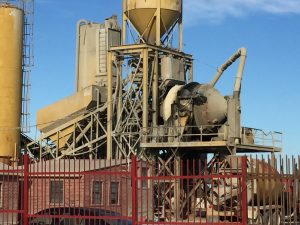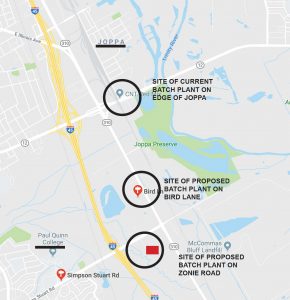Citizen Action
Downwinders At Risk c4 Board Endorses Scott Griggs for Dallas Mayor
Also expected to quiz School Board candidates on electric buses
Citing his role in stopping illegal gas drilling in Dallas, opposition to the Trinity River toll road road, and healthy skepticism of City Hall bureaucracy, the “c4” board of Downwinders at Risk voted to endorse Scott Griggs for Dallas Mayor at its February meeting.
“No one else running for Mayor has done as much to protect Dallas residents from very bad ideas, often against very big odds, than Scott Griggs” said Downwinders at Risk Director Jim Schermbeck. “No other candidate even has a track record of environmental accomplishments, much less one that includes slaying Goliaths like “done deal” gas drilling or the zombie toll road. If you want to be sure Dallas will be Greener in deed as well as rhetoric, there’s really only one choice this time.”
Griggs was first elected to the Dallas City Council in May 2011 representing then-District 3 including West Dallas, Oak Cliff, and Mountain Creek neighborhoods. After redistricting in 2013, Griggs was reelected to represent residents of North Oak Cliff in the redrawn District 1. He was reelected again in 2015 and 2017. In his first term Scott was voted as the 2012 Best Politician by D Magazine and the Dallas Observer. He’s known as a studious council member who’s often more prepared to talk about city policy than city staff.
Griggs was a well-received special guest speaker at Downwinders’ 1-Day University this last December, where he brought his daughter Catalina along on their way to a dance recital.
 Along with the mayoral endorsement, the c4 board also voted to send a questionnaire to Dallas Independent School District board candidates asking about their support for school bus fleet electrification. It’s believed to be the first time bus electrification has shown up as an issue in a DISD election.
Along with the mayoral endorsement, the c4 board also voted to send a questionnaire to Dallas Independent School District board candidates asking about their support for school bus fleet electrification. It’s believed to be the first time bus electrification has shown up as an issue in a DISD election.
While non-profit c3 boards must devote the majority of their time and money to educational efforts, c4 boards are allowed wide latitude in advocating, lobbying and contributing to campaigns. Like many non-profits Downwinders at Risk has both.
Dallas Climate Plan’s “Public Participation” is Neither Very Public nor Participatory
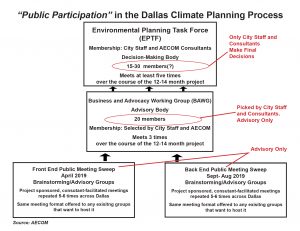
Despite supporters’ claims that the new $500,000 Dallas Climate “Action” Plan would have lots of opportunities for public participation, the decision-making apparatus drafting the plan puts all the decision-making power in the hands of City staff and its hired consultants.
Meet the New Boss. Same as the Old Boss.
Oh, they’ll be countless PowerPoint presentations and “brain storming” sessions around the city over the next year in meetings sponsored by City Hall and neighborhood associations, but those will have exactly zero official standing in the final plan. Suggestions and comments will be harvested but they don’t have to be included – not even if they’re extremely popular in all those meetings.
Those community meetings are the foundation for the process AECOM consultants outlined at the City’s Climate Symposium on February 4th. They’re at the very bottom of the plan’s purported decision-making pyramid. This MO is familiar to anyone dealing with Dallas City Hall in the recent past: “We’re happy to give you all the well-publicized public meetings you want. Just don’t ask us to let the public in the room when the actual decisions are being made.”
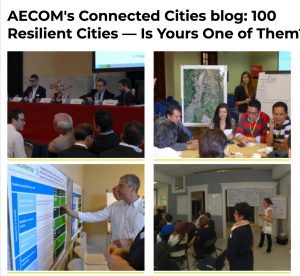 To maintain the illusion of someone other than city staff and consultants being involved, there’s a 20 member “Business and Advocacy Working Group, or “BAWG” (pronounced like the noun describing the soft ground formed by decaying plants, but also like the British slang term for a toilet, as in “Do you have any Bog/BAWG paper? We ran out.” Either metaphor is probably apt here.)
To maintain the illusion of someone other than city staff and consultants being involved, there’s a 20 member “Business and Advocacy Working Group, or “BAWG” (pronounced like the noun describing the soft ground formed by decaying plants, but also like the British slang term for a toilet, as in “Do you have any Bog/BAWG paper? We ran out.” Either metaphor is probably apt here.)
This august body will be, let’s see, what was the very civilized term used by the AECOM consultant at the Symposium? “Curated,” that’s it. The BAWG members will be “curated” by city staff and AECOM. We thought that was such a precious term for “hand-picked by the Powers-That-Be.”
So City Hall and AECOM will hand pick the 20 members of this working group, at least half of whom will be Dallas “Bidness” folk. That leaves 10 or less slots for “advocates” like the Texas Tree Foundation, the Texas Nature Conservancy, and other City Hall friendly-groups who are allies or have the blessing of Dallas (Rockefeller) “Resilency” Czarina Theresa O’Donnell. Of course O’Donnell proved her green bone fides earlier this decade when she passionately defended the idea of drilling for gas in Dallas public parks.
Despite other cities singling-out “equity” concerns for their own tracks, there’s absolutely official zero intent in the Dallas Office of Environmental Quality and (Rockefeller) Sustainability to do so here. Not even after going around the last six months proclaiming how concerned City Hall was about black kids with asthma. Local environmental justice advocates approached the OEQ(R)S last month with the idea of establishing an “equity working group” as part of the public participation process. They were told the City wasn’t interested.
Remaining remarkably consistent with their current management philosophy city staff dismissed the idea that more Dallas residents being involved in the planning process was a good thing. When the EJ groups brought up the recently-completed San Antonio plan which established not only a business-environmentalist steering committee but working groups on “Energy and Buildings,” “Transportation and Land Use,” “Solid Waste Resources, ” Water and Natural Resources,” and “Equity,” staff responded that San Antonio City Hall had warned them to avoid all that democracy. “There were too many people involved down there” was the reply, which will surely come as a surprise to the 86 San Antonio activists who participated.
Despite all this official gate-keeping surrounding the Climate Plan’s BAWG/BOG membership in Dallas, the actual on-the-paper influence of this curated working group is questionable since it only meets 3 times over the course of the year long drafting process. For most of those 12 months this “working group” is unemployed.
Which brings us to the real decision-makers at the top of the pyramid, the “Environmental Planning Task Force, or “EPTF.” Gesundheit!
Comprised exclusively of city staffers and consultants, this Task Force will oversee the day-to-day machinations of the climate plan, and most importantly what recommendations to include, or not, and what timelines are “realistic” vs “not practical.” While there’s a patina of public participation in its “listening tours” the final arbiters of Dallas’ climate plan remain completely removed from public transparency, accountability and meaningful participation.
It didn’t have to be this way, at least not without a fight.
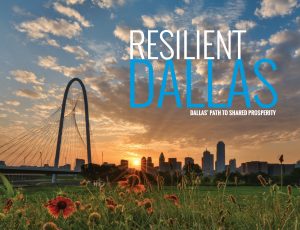 The same mainstream green groups that signed-off on City Hall using Dallas’ moribund plastic bag fund to pay for this plan could have demanded authentic public participation in return for their support. They could have asked for Southern Sector groups to have their fair share of representation at the table. They could have requested multiple resident-staffed working groups like San Antonio. They could have asked for real oversight and decision-making. Dallas City Hall needed them and their lobbying last August during the budget town hall meetings, but they gave up their leverage without asking for anything in return (that we know about anyway). This current public participation plan that really isn’t, is the result.
The same mainstream green groups that signed-off on City Hall using Dallas’ moribund plastic bag fund to pay for this plan could have demanded authentic public participation in return for their support. They could have asked for Southern Sector groups to have their fair share of representation at the table. They could have requested multiple resident-staffed working groups like San Antonio. They could have asked for real oversight and decision-making. Dallas City Hall needed them and their lobbying last August during the budget town hall meetings, but they gave up their leverage without asking for anything in return (that we know about anyway). This current public participation plan that really isn’t, is the result.
As we noted in our last post about this subject, perhaps the only good thing about this process is that’s it gives Dallas residents a chance to upset the cart with their own ideas about how a climate plan for the city should be assembled. There’s already rumblings about a citizens’ planning process to shadow the staff’s version and provide an honest measuring stick for it. That would be a good idea. Unlike city staff, Downwinders believes the more people in the room, the better the decisions being made.
We Won! Dallas Plan Commission Votes 7-3 to Deny Approval of Bird Lane Batch Plant
It’s the 5th time in the last 13 months residents of
South and West Dallas have beaten back City staff attempts to put more polluters in their backyards
But this time they had to take on
their own Council Member and Plan Commissioner.
Channel 5 Coverage
City Hall Videotape Plan Comm. Mtg
(batch plant case begin about 20 minutes in)
In one of the most impressive recent displays of South Dallas neighborhood empowerment, residents won their fight last Thursday at the Plan Commission to keep yet another batch plant from setting-up shop among them.
But unlike past battles, they had to overcome their own Council member and his Plan Commissioner to do it.
Residents, as well as representatives from the Joppa Freedman Township Association, Paul Quinn College, the Inclusive Communities Project, and Downwinders at Risk all spoke out against the idea of transforming another piece of South Central Expressway property into a hub of heavy industry.
Leading the other side in support of the Bird Lane batch plant was of course the company proposing it, Estrada Concrete, and their consultants, but also District 8 Council Member Tennell Atkins’ Plan Commissioner, Chris Lewis. Bird Lane is in District 8.
Usually the support or opposition of the home district Council Member and Commissioner is key to the final tally, but in this case, the strength of the case against the plant was so solid, and Lewis’ plea to approve it so feeble, that a majority of his peers rejected his request. As these things go, it was a huge, humiliating smack down.
Lewis’ anti-citizen stance is more shocking once you know that only five days earlier he’d assured District 8 residents he’d be voting against the batch plant. Instead, the moment the last of the opposition speakers finished (there were no residents speaking in favor), he immediately made a motion to approve the batch plant.
Needless to say, that turn of events caught everyone opposing the plant off guard and provoked a rowdy backlash in the audience that built until the final vote was taken.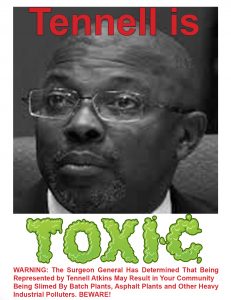
If it hadn’t been for District 11 (Kleinman) Commissioner Jaynie Schultz, District 3 (Narvaez) Commissioner Deborah Carpenter, District 5 (Callahan) Commissioner Tony Shidid, and District 1 (Griggs) Commissioner Jarred Davis raising objections, asking hard questions, and pointing to specific guiding language in the Dallas Planning Code, the vote would have gone against neighbors. In other words, there were at least four other Commissioners doing the work on behalf of District 8 residents that Mr. Lewis was appointed to do. Both Kevin Felder’s and Casey Thomas’s slots on this important body are currently MIA because they haven’t yet named replacements for their departed Commissioners.
That’s not a traditional liberal-conservative alliance that defeated the batch plant– you won’t find Scott Griggs and Rickey Callahan tossing back beers together. Nor is it a strictly black and white split. Of the two black Commissioners present, the only one voting for the batch plant was Mr. Lewis.
It was a neighborhood/Citizens Council split.
Not in any “big” issue, lots-of-phone-calls-before-the-vote kind of way. Rather, in a small, looking-out-my-own-backdoor kind of way.
Commissioners who opposed the batch plant couldn’t imagine looking out their own doors and seeing this thing as a neighbor. Those voting in favor knew such a fate was impossible for them.
Final proof is found in looking at who voted in favor of Lewis’ original motion to approve the batch plant. It included longtime Dist 15 (Rawlings) Commissioner Gloria Tarpley who’s distinguished herself in the past by voting for illegal gas drilling, and the Commissioners from Districts 13 (Gates), and District 10 (McGough).
As per usual, Dallas City staff had recommended approval of the Bird Street Batch plant, so residents really were fighting the entirely of City Hall – including the guy that’s supposed to be their full-time advocate at the place. And yet they persisted. And they won.
As it happens, the knock -out was a twofer. Not only did District 8 residents defeat the Bird Street batch plant, but they also learned that plans for Estrada’s other proposed batch plant around the corner on Zonie Road were being pulled as well.
Their victory – your victory too thanks to over 100 emails of opposition sent through our Citizen Action portal – was one event in a series of recent events that have given environmental justice issues in South Dallas some real traction of late. The first Joppa batch plant fight last March, announcement of the new Superfund site near Paul Quinn, discovery of Marsha Jackson’s “Asphalt Alps,” and other open wounds are beginning to provoke community self-defense responses.
Whether those responses can overcome South Dallas business as usual at the ballot box in May, or produce systematic change at City Hall, is a large and important question not only for South Dallas, but Dallas as a whole. We all live in neighborhoods. We all live downwind.
THANKS!
You generated over 60 letters of opposition to the Bird Lane Batch Plant
Zoning Vote for Bird Lane Batch Plant Pulled from December 13th Plan Commission Agenda
Individual Hearing Scheduled
Thursday January 17th, 1:30 pm
Dallas City Hall Rm 5ES
Speak Out Against Environmental Racism
The first of two Estrada Concrete batch plants proposed for right around the corner from Blue Star Asphalt Recycling and initially slated to be routinely approved as part of a group of more mundane zoning requests, is now scheduled for its own hearing and vote next month.
Thanks to neighborhood opposition, including, God Bless Them, Temeckia Dorrough and Marsha Jackson plus the Inclusive Communities Project, institutional opposition from near-by Paul Quinn College, and over 60 letters generated through the Downwinders’ Click N Send feature, the Plan Commission pulled the batch plant form its consent agenda on December 13th and scheduled a separate hearing and vote on the case for January 17th.
Had vigilant citizens not plugged-up the City Hall pipeline, this is a zoning change that would have passed easily with full staff support and without even a record vote by the Commission.
At stake is issuance of a Special Use Permit, or SUP, the owners need to operate a concrete batch plant on the Bird Lane property for a minimum of three years.
Still unknown is when the OTHER Estrada Concrete batch plant also gets the green light for a scheduled vote. It’s proposed for Zonie Road, immediately adjacent to and downwind of homes and a shingle’s throw from troubled Blue Star Asphalt Recycling. It’s possible both sites could be on the same January 17th Plan Commission agenda.
The Bird Lane site is already zoned Industrial Research (IR) while the Zone Road site is zoned Agricultural with a pending request to zone it Industrial Research as well. IR and Industrial Manufacturing, or IM zoning next to minority residential neighborhoods along the Trinity River has been the source of most local environmental justice battles.
Opposition is based both on the specific problems the batch plants would cause for neighbors, and the fact that this part of South Dallas already has a disproportional amount of polluting industries.
Come January we’ll be adjusting our Click N Send messaging to reflect the new Plan Commission hearing and vote date and let you know when you can have another big impact with your letters of opposition.
Discussion of both these proposed batch plants and the underlying zoning issue which keeps facilities like this coming to South Dallas will be on the agenda at the next “Let Joppa Breathe” Alliance meeting, scheduled for January 14th.
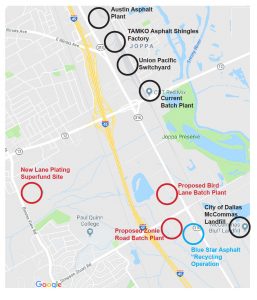
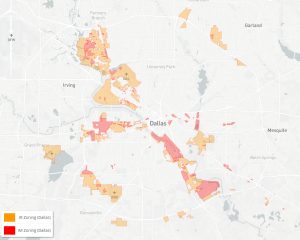
Xmas Brings a “Miracle on Choate Street”

Blue Star “Recycling” exposed by citizens and
reporter as one big illegal asphalt dumping
ground in South Dallas
City forces closure…once it finds out about it
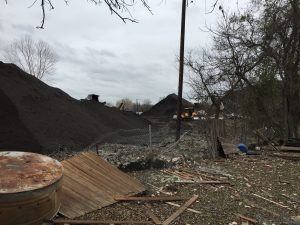
The view from Marsha Jackson’s backyard
Last week there was what you might describe as a kind of South Dallas Christmas Miracle Story – as in, “It was a miracle the city finally did anything to stop that crap.”
For a blow-by-blow account of how it all went down, you can read Dallas Morning News city columnist Robert Wilonsky’s account in two separate installments that ran in last Thursday’s and Friday’s paper here and here.
They tell the saga of Marsha Jackson’s one-woman fight to save her home of almost 30 years from being swallowed up by huge mountains of asphalt and used shingles by a company claiming to recycle them. A company that only popped up in the last 12 months or so and has completely destroyed her quality of life.
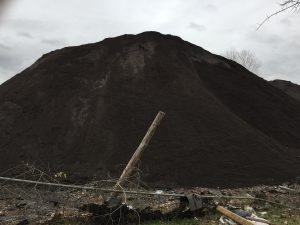 No photos or video can do her situation justice. Towering 3-5 story piles of what looks like coal dust are looming over her house, right up to the fence line that’s broken because of them. Heavy-duty diesel equipment is everywhere and in constant motion, moving piles of asphalt chips and shingles around. Large shingle-shredding machines spit out chips from both ends. A foul-smelling asphalt cooking operation adds a sulfuric haze. It goes on well into the night.
No photos or video can do her situation justice. Towering 3-5 story piles of what looks like coal dust are looming over her house, right up to the fence line that’s broken because of them. Heavy-duty diesel equipment is everywhere and in constant motion, moving piles of asphalt chips and shingles around. Large shingle-shredding machines spit out chips from both ends. A foul-smelling asphalt cooking operation adds a sulfuric haze. It goes on well into the night.
Ms. Jackson has been complaining about this situation to everyone, from the Texas Commission on Environmental Quality to the City of Dallas, for over a year. Despite her best efforts those complaints never got heard or acted upon. It might have remained that way for a good while longer.
Instead, what happened to Ms. Jackson is the kind of thing that usually only happens in movies.
On November 13th, Ms. Jackson met tenacious Temeckia Durrough of the Joppa Freedman’s Township Association at a community meeting about the new Lane Plating Superfund site in South Dallas. They exchanged their own outrages. Temeckia invited Ms. Jackson to come to the next Let Joppa Breathe Alliance meeting on December 4th to tell her story and add some people power.
She did and then she begin sending photos and video of what was right outside her window. Those prompted visits to collect our own evidence. Sprawling over multiple acres, artificial ridges of asphalt bits and and shingles ring the site and come right up to the edge of a creek that flows into the Trinity River a short distance away. There’s nothing to keep those piles from sliding into the creek and sure enough, that’s what’s been happening over the last year.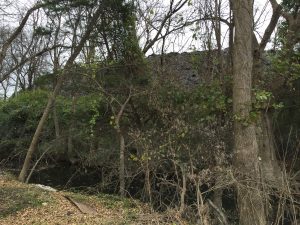
Exasperated by the actual site, Downwinders then reached out to a handful of local reporters capable of throwing a hot and heavy spotlight on an injustice. “Please help this woman living under/on top of a growing giant asphalt blob“ was the subject line of our December 10th plea. We suspected the only way to cut through all the reasons why nobody could help Ms. Jackson was to expose the fact that nobody was helping her.
To his credit Dallas native Robert Wilonsky, city columnist for the Dallas Morning News, answered the call. He went out to Marsha Jackson’s house and like everyone else except the agencies who are supposed to be outraged by this kind of thing, was indeed outraged. And that’s when things started to happen.
After trying to get basic information on Blue Star from Dallas City Hall he was even madder. Like the rest of us mere citizens, he was told he’d have to file an Open Acts Request – just to see the city inspection files, certificate of occupancy, etc. But maybe the reason the City didn’t want anyone looking is because Blue Star didn’t have ANY of the necessary paperwork to do what it’s doing, as Wilonsly later found out.
Because he was snooping around City Hall, Wilonsky was contacted by District 8 City Council Member Tennell Atkins on Wednesday, December 12th. Wilonsky urged Atkins to look into the awful situation…in his own council district. That he’d been getting complaints about for months.
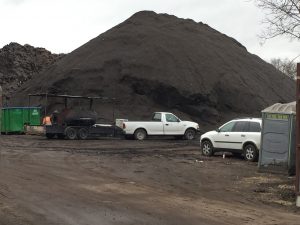 But after a visit, code compliance officer in tow, Atkins was full of righteous indignation. As was the Dallas Office of Environmental Quality and (Rockefeller) Sustainability, whose Director only learned about Blue Star from Wilonsky in passing…on Thursday the 13th, when Wilonsly’s first column on Blue Star went up in the early afternoon.
But after a visit, code compliance officer in tow, Atkins was full of righteous indignation. As was the Dallas Office of Environmental Quality and (Rockefeller) Sustainability, whose Director only learned about Blue Star from Wilonsky in passing…on Thursday the 13th, when Wilonsly’s first column on Blue Star went up in the early afternoon.
By Friday, December 14th, a month and a day after Marsha Jackson and Temeckia Durrough first met, the City was filing motions in court to close Blue Star down for at least a week. Considering how much official paperwork is lacking on the site, the fact that it’s the subject of an on-going TCEQ investigation, and is sorely liable to lawsuits by its neighbors, let’s hope it never opens again.
We don’t know how those huge piles are going to get cleaned-up yet but at least they’re not being added to. For now, the activity on the site that was a constant nuisance and health threat to Marsha Jackson has ceased.
In less than seven days the phone calls and emails of the most widely read local columnist for the only daily in town won a victory that months of campaigning through official channels by an ordinary citizen had been unable to pull off. Time and again the system let Marsha Jackson down until that institutional failure was the story that made the outrage stop.
Call it Ms. Jackson’s own hard-won Christmas Miracle.
Was it not for her persistence, this series of unlikely events could not have happened. Were it not each supporting link in the chain along the way – Ms. Douglas’ fateful invitation to Jackson to attend a community meeting, our gigging local journalists, one of those journalists actually being interested – there would be no happy ending to report yet. That’s how tenuous environmental justice is in Dallas.
Besides showing the rewards of desperate determination, it was a lesson in grassroots perspectives for Reporter Wilonsky as well. Like most of us, he was dumbstruck by the fact that you can’t simply make an appointment to show up at City Hall, sit down, and read the official records on a company doing business next to you. Like many of you, he found out firsthand how passive the City is toward on-going disasters like the one next door to Ms. Jackson…until they become fodder for a front page column.
But we can’t depend on a single reporter to do the work of whole agencies, no matter how influential. This was the exception that proves the rule.
Even while the spotlight shone brightly on Blue Star, a hearing on a zoning change allowing a new concrete batch plant right around the corner was taking place at City Hall with a recommendation by city staff that it be approved. It’s one of two being sought in the same stretch of SM Wright freeway, which isn’t too far from the new Lane Plating Superfund Site, which isn’t too far from the TAMKO asphalt roofing shingles factory, the large Union Pacific switch yard, the Austin Asphalt plant and the Redi-Mix batch plant in Joppa. Fortunately, citizens were there to stop that mistake from happening as well.
Instead of seeing these as individual facilities like City Hall does, they should be seen as symptoms of the same problem of obsolete racist zoning plaguing South Dallas. As long as heavy industry is allowed to plop down next to homes in a way not allowed in east or north Dallas, you’ll see wave after wave of Blue Stars and batch plants targeting this area.

A wholesale examination of industrial zoning, of zoning that pollutes, should be taking place at Dallas City Hall as part of its revamped Economic Development policy. In the same way that the City recently said it won’t be a party to adding to concentrations of poverty through the siting of low income housing, it should also be policy not to add to concentrations of pollution in neighborhoods already absorbing more than their fair share. This requires a proactive perspective that has no sign of showing up within the ranks of the Office of Environmental Quality and (Rockefeller) Sustainability staff any time soon. That means residents are going to have to do this themselves – despite staff.
Just like Ms. Jackson, they’re going to have to be persistent in their demands. They’re going to have to stay focused. And maybe, just maybe if the right combination of chords can be struck, in the right sequence, at the right time, another more far-reaching chorus of “Hallelujah” can be sung in praise of a civic miracle. This time for all of South Dallas.
Environmental Justice Alert! Help Us Stop the First of Two New Batch Plants Proposed for South Dallas
Plan Commission Action THIS Thursday
You can send a email opposing both proposed batch plants to the Plan Commission today
JUST CLICK HERE
On Thursday the Plan Commission will vote on an SUP for the Bird Lane batch plant site – one of two being proposed by Estrada Concrete along the Stuart-Simpson/Central corridor in South Dallas.
There is more than a little suspicion that this is a backdoor way to get the pair of batch plants that were defeated by Joppa residents in March back in play – only in a more business-friendly council district. The two new requests are coming from a very small company run out of a house with only one batch plant in operation now, located in an industrial park in Hutchins just six minutes down the highway.
To defeat this bad idea we need you to:
1) let the Plan Commission know you oppose the batch plants and the zoning changes they require ASAP. Please use our simple ClickNSend email letter template to send a letter of opposition. Add your own comments if you want. It’s already addressed to all the Plan Commission members. All you have to do is fill it out and “click send.”
2) show up on Thursday at the Plan Commission to voice your opposition in person if you can:
DALLAS CITY HALL
CITY PLAN COMMISSION MEETING
THURSDAY, DEC 13th
ROOM 5ES
1:30 pm
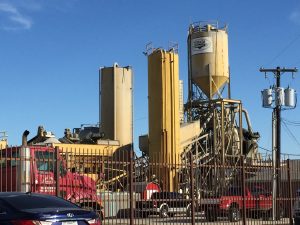
Staff has recommended approval of a Special Use Permit to operate a batch plant for three years at this Bird Lane site, which is next to homes and right around the corner from a second batch plant site the same company – Estrada Concrete – is pursuing via a zoning change request.
Since there are two sites there are two votes. The other site won’t come up for a vote until January 3rd at the earliest, but this Bird Lane site is gong through the pipeline now.
What’s needed now is sending these Plan Commission members lots and lots of emails saying we oppose these zoning changes and Special Use Permits AND are seeking a individual hearing for the Bird Lane site on the 13th.
There are two different types of agenda items when it comes to city decisions. One is the “individual” agenda item for which topics will be discussed and the public can make comments.
The other type of agenda item is a “consent” agenda item in which case the topic is not discussed and the group simply votes on it with the understanding that most agree with what is being proposed.
In this case, the batch plant’s Specific Use Permit (SUP) request has been recommended by staff for approval for a three year period and it is assumed that none of the city plan commissioners oppose the staff recommendation.
Dallas residents opposing this Bird Lane batch plant should contact their own District’s Plan Commissioner and City 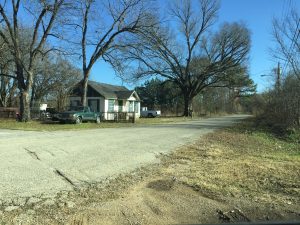 Council Member and let them know know you want the Plan Commission to pull the item from the “consent” agenda so it will individually discussed on the 13th as part of the public hearing portion of the agenda instead of the done deal “consent” part.
Council Member and let them know know you want the Plan Commission to pull the item from the “consent” agenda so it will individually discussed on the 13th as part of the public hearing portion of the agenda instead of the done deal “consent” part.
A hearing requires the public to be heard and a recorded vote take place by Plan Commission members for some kind of action – Delay, Disapproval, or Approval. We get to make our case against the batch plant only if it’s pulled off the consent agenda.
Folks opposing the zoning change may speak against the staff’s recommendation if they choose. The hearings start at 1:30 PM and can last through the early evening. It’s hard to tell what time the item will be heard, so be prepared to come and stay awhile.
The CPC docket is available https://dallascityhall.com/government/meetings/DCH%20Documents/plan-commission/12-13-2018_CPC_Docket.pdf
CLICK HERE TO SEND YOUR LETTER OF OPPOSITION
Thanks to everyone who made the 1-Day University of Change a Useful and Productive Day







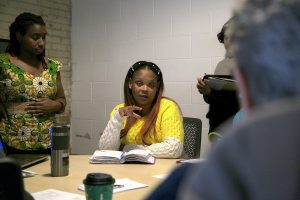
Electric Buses: A Big Climate Change and EJ “Something You Can Do Now”
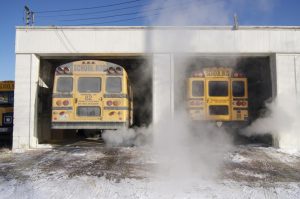
Register for the Electric Glide Bus Pub Crawl here.
Thursday, December 6th
Catch the bus at 6:30 or 7:00 pm
at the Green Door in the Farmers Market District
600 South Harwood Dallas 75201
Plug In. Get Lit. Stay Current.
How did we get from cement plants burning hazardous waste in Midlothian to transit or and school buses making runs in inner city Dallas?
The answer is PM, Particulate Matter. The two-decade fight against the cement plants was one long primer on PM pollution. They were, and remain the largest industrial sources of the pollution in North Texas. We learned firsthand about the toxicity, reach, and insidious health effects of PM pollution. Not just strokes and asthma, but IQ loss, Autism, Dementia, Diabetes, low-weight births. PM is the new lead.
Every boiler, furnace, fire, flame and combustion engine produce PM. Diesel engines emit an exceptionally toxic form of PM called Black Carbon.

Because they’re on the road so much, are diesel or natural gas-powered, and make people wait by the side of traffic-heavy roads to ride, bus systems turn out to be a major source of PM pollution. And climate change gases. And smog. A rough estimate shows DART’s bus fleet would be the 10th largest PM source in Dallas County if it were all parked in one spot. But of course its the dispersed nature of a bus fleet’s pollution that often makes it more of a widespread threat to public health than a stationary “point source” a.k.a. an industrial facility.
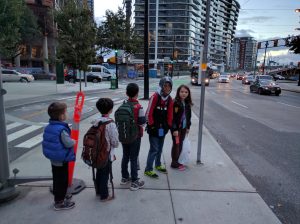
What’s missing is a constituency for electrification of school district bus fleets and transit agencies like DART and Trinity Metro. Because of the potential impacts and benefits, this could be a wide-ranging and powerful alliance – PTAs, transit riders, physicians, environmentalists, environmental justice advocates, and even the utilities that could buy the power from bus batteries. But until we get the ball, er wheel rolling, its all just that – potential.
One of the reasons we’re sponsoring the December 6th “Electric Glide bus pub crawl” as part of this year’s Root and Branch is that we wanted to start that rolling. And real, wheels-on-the-bus-go-round-and-round rolling discussions and presentations on the advantages of electric buses are part of the evening, but so is just showing your support for the goal of electrification as something local officials could accomplish right now, especially if they combine their collective purchasing power.
The more people that show-up on the 6th, the more DART and local school boards – whose memberships we’re inviting as well – will get the impression someone gives a damn and the more we’re a force to be reckoned with. We need a people’s lobby for 21st Century electric buses in DFW.
 In exchange for coming out and forking over $25, we give you three custom drinks, Graham Dodds’ food, a presentation by Dale Hill, the co-founder of the Proterra electric bus manufacturer, and maybe, just maybe some food for thought about what we all can do right now to advance a bunch of causes in one campaign that’s winnable at the local level in the Trump era.
In exchange for coming out and forking over $25, we give you three custom drinks, Graham Dodds’ food, a presentation by Dale Hill, the co-founder of the Proterra electric bus manufacturer, and maybe, just maybe some food for thought about what we all can do right now to advance a bunch of causes in one campaign that’s winnable at the local level in the Trump era.
Register for the Electric Glide Bus Pub Crawl here.
Thursday, December 6th
Catch the bus at 6:30 or 7:00 pm
at the Green Door in the Farmers Market District
600 South Harwood Dallas 75201
Plug In. Get Lit. Stay Current.
Council Member (& Dallas Mayoral Candidate?) Scott Griggs is 1-Day University of Change Lunch Speaker
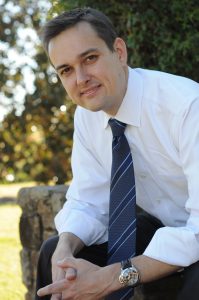 If a full day of informative workshops by experts, networking with other local activists and organizers, plus lunch wasn’t enough to get you interested in coming to our 1-Day University of Change on Saturday December 8th, what about a mid-day briefing from long-tine Oak Cliff Council Member Scott Griggs on the importance of the upcoming May municipal elections – an election that may see him running for Mayor of Dallas?
If a full day of informative workshops by experts, networking with other local activists and organizers, plus lunch wasn’t enough to get you interested in coming to our 1-Day University of Change on Saturday December 8th, what about a mid-day briefing from long-tine Oak Cliff Council Member Scott Griggs on the importance of the upcoming May municipal elections – an election that may see him running for Mayor of Dallas?
Griggs is associated with “good government” initiatives making City Hall more transparent and accountable, but he’s also been a forceful advocate for New Urbanism “green government.”
Although widely remembered as a critic of the now-dead Trinity Toll Road, Griggs was first elected in 2011 with quite a bit of help from Dallas gas drilling opponents.
Seven years ago the Barnett Shale was still hopping and every local government was trying to cash in without concerns of any downside. Fights over drilling restrictions in Fort Worth, Southlake, and Grapevine had preceded the Dallas battle and industry wanted to impose the “Fort Worth model” of unchallenging drilling provisions on Dallas.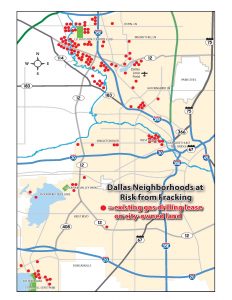
In 2011, nobody had yet discovered the secret agreement between then City Manager Mary Suhm and Driller Trinity East that gave permission to do all kinds of things not allowed by the city at the time – like drilling in floodplains and parks. City staff was going out of its way to shepherd drilling permits for the company through the bureaucracy even as citizen opposition convinced other drillers like Exxon to pull out of Dallas. Nobody could figure out why until the secret agreement was leaked to the Dallas Observer. There’s no direct evidence of who released the agreement, but speculation centered on Griggs, and then-city council member Angela Hunt.
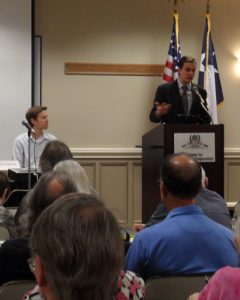
CM Scott Griggs addressing citizen Town Hall on gas drilling in 2012
From that point forward citizens begin winning more votes at the Planning Commission and Council. First to go was the favoritism staff had shown the proposed Trinity East drilling permits. They were defeated outright and resulted in a lawsuit filed by the company still in the courts over who promised to do what for whom. In the wake of their demise, the most protective gas drilling ordinance then proposed for any Texas city was passed by the Dallas Council. It established a more restrictive “Dallas model” to counterbalance the more lenient Fort Worth one.
If the only major accomplishments of Griggs city council years was killing the Zombie Toll Road and saving Dallas from irresponsible gas drilling, he’d have earned his pay. But those are only two of the many battles Griggs has fought with City Staff and his more establishment-oriented colleagues. The recent historic change in the city’s housing policy was fueled by his reforms. For the first time the City has made it policy not to keep concentrating subsidized housing in South Dallas areas which already have more than their fair share amidst high rates of poverty and lack of employment opportunities.
He’s one of a handful of council members who’s made it their business to take on entrenched city staff 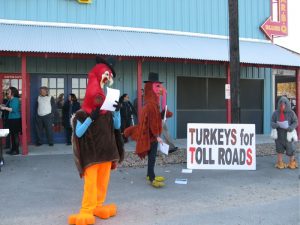 time and again over issues of responsiveness and common sense. Even though he sits on the other side of the horseshoe, he has the healthy skepticism of a citizen still fighting City Hall.
time and again over issues of responsiveness and common sense. Even though he sits on the other side of the horseshoe, he has the healthy skepticism of a citizen still fighting City Hall.
We’re not the only ones who hold a high opinion of Griggs. D magazine names him “Best Politician” in 2012 and Best Public Official 2016. the Dallas Observer named him Best Politician (2012) and Best Council Member (2013, 2015). The venerable Oak Cliff Conservation League gave him their Oak Cliff Warrior Award in 2015.
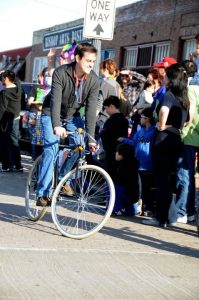 Griggs terms-out as of this coming May and speculation is running high that he’s preparing to run for Mayor. If he wins there’s no doubt he would be the most progressive mayor for Big D since Laura Miller ten years ago. Depending on who takes his place and what other candidates win, Dallas could end up with an 8-vote solid voting progressive/green majority for Griggs. That promise of a truly reform-minded council is what’s motivating a new wave of anticipation for the municipal elections, especially after a very successful November in Dallas County as a whole.
Griggs terms-out as of this coming May and speculation is running high that he’s preparing to run for Mayor. If he wins there’s no doubt he would be the most progressive mayor for Big D since Laura Miller ten years ago. Depending on who takes his place and what other candidates win, Dallas could end up with an 8-vote solid voting progressive/green majority for Griggs. That promise of a truly reform-minded council is what’s motivating a new wave of anticipation for the municipal elections, especially after a very successful November in Dallas County as a whole.
Downwinders is proud to host the lunch time briefing from Council Member Griggs. Just as progressives used the recent mid-terms as a way to build a bluer Congress and State House, locals will be seeking to use the May Dallas elections to seat the most environmentally friendly city council it’s ever known.
Local governments are becoming the launching pads for change as state and federal agencies retreat or surrender their basic quality of life responsibilities. Having a progressive majority in Dallas that could join this effort would be a huge jump start for all kinds of good things to happen.
If Griggs decides to run (the window for filing to run in May begins January 16th) 1-Day University participants could get a sneak peak at the kind of vision he’ll be promoting for the city, maybe a trail run at a stump speech. For Dallas environmentalists, the May elections may actually begin at lunch on December 8th. Make sure you’re there.
Sign up for the 1-Day University here, or pay at the door.
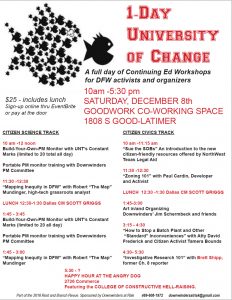
Dallas City Hall Stonewalls Open Records Requests for Mystery Clean Air Fund and Joppa Polluter
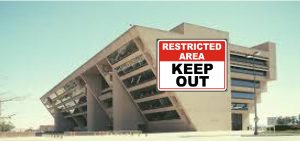
The question sounds like the lead-in to a joke, but it’s not: How many months does it take Dallas City Hall to respond to a simple Open Record request? Answer: we don’t know yet, we’re still waiting.
Back in July, you might remember we reported on the establishment of a regional clean air fund to fight coal plants a decade ago that still had over a half million dollars in it.
When we dug a little further, we got a response that the fund had been shut down and the money disbursed – despite the fact nobody could give us the details on how or why that happened, where the money went, and if any of it went to clean air work.
So we filed a Texas Open Records Act request to get any and all files on the fund. On July 16th. Governments have 10 days to respond and provide the files that aren’t attorney-client products. We have yet to get the paperwork we asked for from the City. What we have received is one after another email saying the response has been delayed…again. We’re now going on three months awaiting information for a fund that supposedly doesn’t even exist anymore. And this is after the city already received permission from the State Attorney General’s office to withhold certain files from us because they were “attorney product.” What is it about this fund and that half million dollars that the City of Dallas staff really don’t want their own residents to see?
Just as ridiculous is the city’s response to an Open Records Act request we filed to look at its files on TAMKO in August.
The huge asphalt shingles plant in Joppa had a long sting “upsets” and “accidents” between 2011 and 2015 that released over 7000 pounds of unaccounted for PM pollution. Those are TAMKO’s self-reported numbers and don’t even include fires when there was “100 Opacity” i.e., smoke. We know this because Downwinders was able to access the Texas Commission on Environmental Quality files on TAMKO way back in the summer. We put in the same request to the State that we submitted to the City of Dallas. Believe it or not, TCEQ was much more responsive and cooperative than the City of Dallas, who we’re still waiting on to release their files on the plant. Two months and counting and still no substantive response. Shouldn’t a resident be able to make an appointment, go down to City Hall and look at the public files on a well-known polluter? So far, the City of Dallas says no.
Dallas City Hall has a notorious reputation for mishandling, losing, or otherwise being non-responsive to Open Records requests. They aren’t know as “citizen-friendly.” But these two cases seem extreme because the delay is all out of proportion to the files being requested – for a fund that was shut down and a polluter in South Dallas. It certainly appears that staff is going out of its way not to hand over anything of import, no matter if its attorney work product or not. One can only guess why that is.

